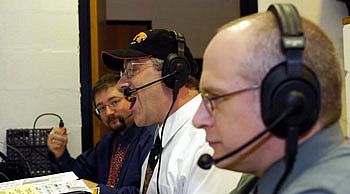The smell is overwhelming.
Randy Bloechl stands in a conference room on a Saturday night at the Milford Ice Pavilion in Southern Connecticut, his broadcast location for the evening’s game between RIT and host Sacred Heart. First place is on the line in Atlantic Hockey, but right now a high school junior-varsity game is under way.
After Friday night’s game, the Tigers stored their equipment in this room, which looks out over the ice surface and has a working phone line. That’s usually all Bloechl needs and sometimes all he has had to work with in his 25 years behind the mic for RIT — a vantage point and a phone line to broadcast the game back to the faithful in Rochester, and for the past several seasons, fans, parents and alumni around the world via the Internet.

“Wow,” laughs Bloechl, reacting to the odor, as the team collects its stuff and heads downstairs to the dressing rooms. “You think after 25 years, you’ve experienced everything, but every game, it’s something else.”
Bloechl laughs a lot — a loud, infectious laugh that comes across often in his broadcasts. His listeners tune in not only for a description of the action, but for Bloechl’s observations on life in general.
“When I listened to radio as a kid and to the old-school broadcasters, they told stories,” he said. “And that’s what made you listen — stories from the road, stories about the players and what went on around the game. The new cookie-cutter guys from ESPN are so on task; they’re afraid to be funny or unconventional because they might get fired.”
Bloechl can’t get fired. In his 25 years broadcasting for WITR and a collection of other commercial radio and TV stations that have picked up his feed, he’s never collected a paycheck.
“Volunteering gives me freedom,” said Bloechl. “We can be less structured. Nobody has ever designed what the broadcast is except for us.”
I’ve had the unique perspective and honor of being Bloechl’s broadcast partner for the past 11 seasons, doing color (always to his right — it’s a superstition/comfort thing). It’s truly the best seat in the house to experience an RIT hockey game.
USCHO.com staffer Ed Trefzger has been around for even longer, as an engineer, producer and emcee for the pre- and postgame shows.
“He’s always been irreverent, and that’s part of what makes him special,” said Trefzger. “As a volunteer, it’s got to be fun or there’s no point in doing it. I’d put Randy right up there with guys that do this for a living. Half of them couldn’t shine his shoes.”
When Bloechl started, he was the same age as the players; now at 45 he’s the same age as the players’ parents. His first broadcasts were as a student at RIT, on the campus’ closed-circuit TV station and later at WITR, the school’s radio station.
“I knew someone from my classes who was the (TV) station manager,” recalled Bloechl. “He asked me if I would be interested in calling some games and I said, ‘Why not?’. That lasted maybe five games and then when the radio station decided to do it, they asked me, and I said ‘Why not?’ again.”
Bloechl says his perspective has changed as he transitioned from a peer of the players to a peer of their parents and the coaches.
“Back then I knew the guys because they were in my classes. One player dated my sister,” he laughed.
“I was just an extra kid on the bus. I was in awe of the coach (Brian Mason). I wouldn’t think of speaking to him back then. Now you’re in a position where you’re the same age as the coach and feel comfortable talking with him, and with the parents.”
Bloechl is more a proud papa to the players now, and spends his time before and after the game talking with their families. And for the ones who can’t be there in person, he’s their lifeline to the Tigers’ games as they listen via the Internet in places like Kelowna, British Columbia, and Chicoutimi, Quebec.
“Randy is an important piece of our program,” said RIT coach Wayne Wilson. “He has a sense of the history here as only he can, because he’s been the one constant throughout the years.
“I admire his commitment to RIT hockey, because that’s what it really is — a big commitment to our program. Our broadcasters are a special group.”
In his 25 years, Bloechl has been at the mic for two national championships, but the memories that loom largest for him are the human ones that often come from losses.
“I think the loss to Union (in four overtimes in the 1984 national semifinal) when Gill Egan scored on Burkie (current Niagara coach Dave Burkholder) stands out. And then the next year at Union (the 1985 national semifinal) when a shot got through (RIT goaltender) Chet Hallice and John Hawkins dove through the crease and knocked the puck away. It would have given them the lead, but we won that game and won the championship the next night.
“I remember the last games for Art Thomas and John Pallante, two players that I respected so much and who were great with my kids. And the loss to Plattsburgh (in the 2001 national championship game) stands out. (RIT forward) Johnny Day was in tears, my kids were crying, my wife was crying, and I was crying.
“And Johnny still wanted to take a picture with our family out on the ice after the game, before he took off his jersey for the last time. Those are the memories I treasure the most — the great guys that have played here and had a personal relationship with my family.”
And of course there are the stories. The RIT crew always travels with a 100-foot phone cord in case they have to improvise. This was especially true in the Division III era where often games were played in less-than-ideal conditions.
Bloechl has done broadcasts from outdoor rinks in snowstorms, from the stands in rinks that have no press box, from trainer’s rooms, from the roof of a locker room, and from rickety, temporary scaffolding. Even in Atlantic Hockey, some of the vantage points aren’t ideal — like the conference room at the Milford Ice Pavilion, odor and all. He’s been taunted and had things thrown at him by opposing fans.
And when a promised phone line isn’t there? No fear. “One time when we were playing the University of Buffalo, the best we could get was a pay phone,” he laughed. “I stripped the wires with my teeth.”
Bloechl’s done games in front of 10,000 people, and some with less than 100 in the stands. He’s done broadcasts from places as far-flung as Colorado Springs, Colorado, Omaha, Nebraska, Huntsville, Alabama and Waterville, Maine.
It’s harder now as Bloechl’s kids get older. His son Rory plays youth hockey, and Bloechl has to miss some of his games. He wants to be the head coach of Rory’s team instead of an assistant who can’t make every game and practice. That makes him talk about retirement sometimes.
When asked why he keeps doing it, Bloechl laughs.
“No clue. I guess it’s because it’s a lot of fun. It’s a gas when someone comes up to you and says, ‘I heard you on the radio last night.’ The thanks we get from the parents keeps you going. And I’ve been fortunate to do this with very good friends. That’s what continues to make it fun and special.”


